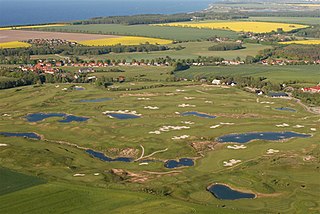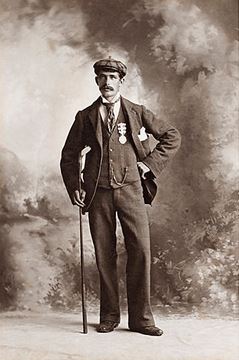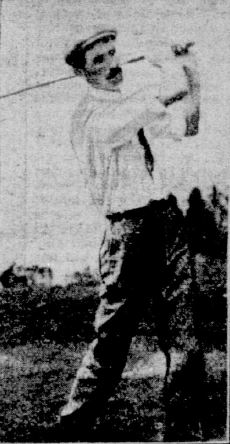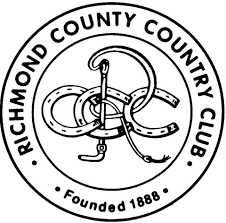
Hamilton is a town in the eastern central portion of Essex County in eastern Massachusetts, United States. At the 2020 census, it had a population of 7,561. Currently the town has no manufacturing industry and no industrially zoned land.
The United States Open Championship, commonly known as the U.S. Open, is the annual open national championship of golf in the United States. It is the third of the four men's major golf championships, and is on the official schedule of both the PGA Tour and the European Tour. Since 1898 the competition has been 72 holes of stroke play, with the winner being the player with the lowest total number of strokes. It is staged by the United States Golf Association (USGA) in mid-June, scheduled so that, if there are no weather delays, the final round is played on the third Sunday. The U.S. Open is staged at a variety of courses, set up in such a way that scoring is very difficult, with a premium placed on accurate driving. As of 2024, the U.S. Open awards a $21.5 million purse, the largest of all four major championships.

A golf course is the grounds on which the sport of golf is played. It consists of a series of holes, each consisting of a tee box, a fairway, the rough and other hazards, and a green with a cylindrical hole in the ground, known as a "cup". The cup holds a flagstick, known as a "pin". A standard round of golf consists of 18 holes, and as such most courses contain 18 distinct holes; however, there are many 9-hole courses and some that have holes with shared fairways or greens. There are also courses with a non-standard number of holes, such as 12 or 14.

Pinehurst Resort is a golf resort in Pinehurst, North Carolina, United States. It has hosted a number of prestigious golf tournaments including four U.S. Open Championships, one U.S. Women's Open, three U.S. Amateurs, one PGA Championship, and the Ryder Cup.

Fred Herd was a Scottish professional golfer from St Andrews. In 1898 he won the fourth U.S. Open at Myopia Hunt Club, in South Hamilton, Massachusetts. This was the first U.S. Open to be played over 72 holes, requiring the competitors to play eight rounds of Myopia's nine-hole course. Herd turned in a card totaling 328, 84-85-75-84, averaging 82 strokes per 18-hole round.

Oakmont Country Club is a country club in the eastern United States, located mostly in Plum with only a very small portion of the property located in Oakmont, suburbs of Pittsburgh in western Pennsylvania. Established 121 years ago in 1903, its golf course is regarded as the "oldest top-ranked golf course in the United States." It was designated a National Historic Landmark in 1987. The Pennsylvania Turnpike separates seven holes (2–8) from the rest of the course.

The Olympic Club is an athletic club and private social club in San Francisco, California.

Congressional Country Club is a country club and golf course in Bethesda, Maryland, United States. Congressional opened in 1924 and its Blue Course has hosted five major championships, including three U.S. Opens and a PGA Championship. It was a biennial stop on the PGA Tour, with the Quicken Loans National hosted by Tiger Woods until 2020. Previously, Congressional hosted the former Kemper Open until its move to nearby TPC at Avenel in 1987. Congressional hosted its third U.S. Open in 2011. Tournament winners at Congressional have included Rory McIlroy, Ken Venturi, Ernie Els, Justin Rose and Tiger Woods, among many others. Congressional is generally considered one of the most prestigious golf clubs in the world.
The 1901 U.S. Open was the seventh U.S. Open, held June 14–17 at Myopia Hunt Club in South Hamilton, Massachusetts, northeast of Boston. Willie Anderson won the first of his four U.S. Open titles in a playoff over Alex Smith.
The 1908 U.S. Open was the fourteenth U.S. Open, held August 27–29 at Myopia Hunt Club in South Hamilton, Massachusetts, northeast of Boston. Fred McLeod defeated 1899 champion Willie Smith in an 18-hole playoff to win his only major title.
The 1898 U.S. Open was the fourth U.S. Open, held June 17–18 at Myopia Hunt Club in South Hamilton, Massachusetts, northeast of Boston. Fred Herd captured his only major title, seven strokes ahead of runner-up Alex Smith.
The Meadow Brook Club is a private golf club in Jericho, New York, Long Island, New York, United States. From 1894 to 1954 it was part of a hunting club, which soon evolved into a major polo club. After the original grounds were expropriated for urban development, it moved to its present location and became primarily a golf club. The Meadowbrook Polo Club is now a separate entity.

Stewart Orr Gardner† was a Scottish-American professional golfer who played in the late 19th and early 20th century. He had seven top-10 finishes in the U.S. Open. His best performance was a T2 finish in the 1902 U.S. Open. In 1924 he served as vice president at large of the PGA of America.
Valentine F. Fitzjohn was a Scottish professional golfer. He finished tied for second in the 1899 U.S. Open and finished tenth in 1900.
John Archibald Park (1879–1935) was a Scottish professional golfer. Park placed sixth in the 1899 U.S. Open, held 14–15 September 1899, at Baltimore Country Club in Baltimore, Maryland. Park also finished tied for ninth place in the 1901 U.S. Open held at Myopia Hunt Club and tied for tenth at the 1915 U.S. Open.
John Jones was an English professional golfer who played in the late 19th and early 20th century. He had two top-10 finishes in the U.S. Open.

Herbert Corey Leeds was an American amateur golfer and golf course architect. Leeds tied for eighth place in the 1898 U.S. Open held at Myopia Hunt Club in South Hamilton, Massachusetts, a golf course of his own design. The U.S. Open was played at the Myopia Hunt Club four times, in 1898, 1901, 1905, and 1908.
Peter Robertson was a Scottish professional golfer who played in the early 20th century. He had four top-10 finishes in the U.S. Open, a tie for third place in the 1905 U.S. Open being his best performance.
Governors Island Golf Course was a military course on Governors Island in New York Harbor, New York City, approximately 800 yards (732 m) from the southern tip of Manhattan Island. The golf course offered one of the most unique golf experiences in New York City due to its views of the Brooklyn and Manhattan skylines, with the Statue of Liberty as a backdrop. It was considered the only golf course in Manhattan as Governors Island is technically part of the borough.

Richmond County Country Club (RCCC) is a private country club in Staten Island, New York. The club includes a golf course, tennis courts, an aquatic facility, and two clubhouses. The golf course and the main clubhouse have impressive views of New York Harbor, the Atlantic Ocean, and the New Jersey highlands. For more than a century Richmond County has been the only private county club in New York City and is one of the oldest in the United States.










